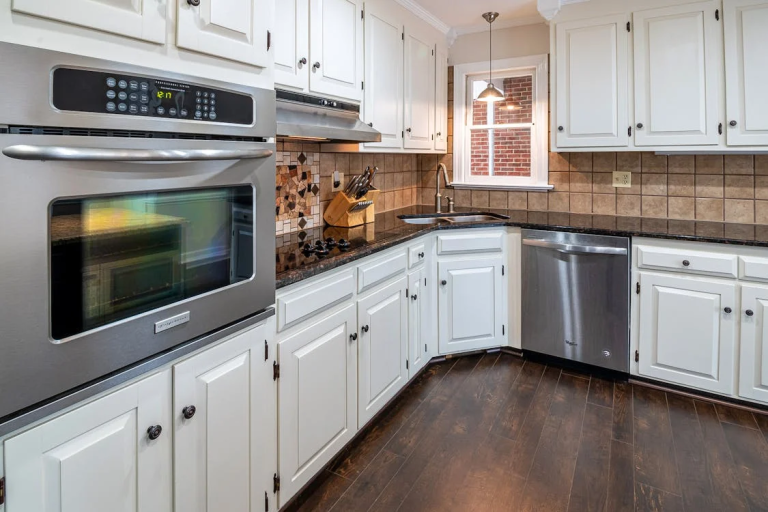Introduction
Selecting the right countertops for your kitchen renovation is a key decision that influences both the look and functionality of your space. With an abundance of material choices, colors, and finishes, making the right choice can be daunting. This guide will walk you through how to choose the perfect countertops, balancing style, durability, and practicality for your lifestyle.
1. Consider Your Lifestyle
Your kitchen countertop is one of the most heavily used surfaces in your home, so it’s important to pick one that suits your lifestyle.
- Durability: If you cook frequently or have a busy household, opt for robust materials like granite or quartz that resist heat, stains, and scratches.
- Maintenance Needs: For low-maintenance options, materials like quartz or laminate are great choices. However, if you’re looking for elegance and are willing to invest time in maintenance, marble or butcher block might appeal to you. Keep in mind that marble requires regular sealing and is prone to stains and scratches.
2. Explore Different Materials
Choosing the right countertop material is crucial, as each one has its unique advantages and drawbacks.
- Granite: Highly durable and heat-resistant, granite adds natural beauty and uniqueness to your kitchen renovations. However, it requires regular sealing to maintain its look.
- Quartz: Made from engineered stone, quartz is non-porous, resistant to stains, and available in a wide variety of colors and patterns. It’s a top choice for those seeking both beauty and low maintenance.
- Marble: If you’re looking for a luxurious and timeless material, marble is the go-to. Its veining patterns create an elegant look, though it’s more prone to etching and staining.
- Laminate: For those on a budget, laminate is an affordable and versatile option. It can mimic the appearance of more expensive materials while being easy to maintain.
- Butcher Block: A warm and rustic option, wood countertops offer a natural aesthetic but require regular oiling and are prone to scratches and water damage. Selecting the right countertops is a pivotal part of any kitchen renovation, as they combine functionality with aesthetic appeal. Factors like material durability, color, and maintenance should align with your overall design goals. For those considering comprehensive kitchen renovations in Melbourne, expert services can help you seamlessly integrate countertops with cabinetry, lighting, and layout to create a cohesive and modern space tailored to your needs and style preferences.
3. Focus on Aesthetics
Countertops are often the centerpiece of your kitchen, so their look matters.
- Color Coordination: Choose colors that harmonize with your cabinets, backsplash, and flooring. Neutral tones like white, gray, and beige are versatile, while darker shades like black or deep brown add contrast and sophistication.
- Patterns: Some materials, like granite and marble, have natural patterns that can serve as a focal point. Others, like quartz and laminate, offer more uniform designs.
- Edge Profiles: The edge profile of your countertop can add character to your kitchen. Choices include a square edge for a modern look, a beveled edge for added detail, or a bullnose or waterfall edge for a softer, rounded appearance.
4. Consider the Cost
Kitchen countertops can range from affordable to high-end, so it’s important to consider your budget when choosing a material.
- High-end options: Materials like granite, quartz, and marble typically fall on the higher end of the price spectrum. While they come with a premium price tag, they also add value and a sense of luxury to your kitchen.
- Budget-friendly options: Laminate and tile are affordable alternatives that can offer the look of more expensive materials at a fraction of the cost. Butcher block is another cost-effective choice, though it requires more care.
5. Think About Maintenance
Maintenance is an important factor, especially if you prefer a low-effort kitchen.
- Low-maintenance options: Quartz and laminate countertops are easy to clean and require minimal upkeep. These materials are ideal for busy families or anyone who wants to avoid regular maintenance.
- High-maintenance options: Materials like marble and butcher block are stunning but require more care, such as frequent sealing and careful cleaning. If you’re willing to put in the effort, they can provide a high-end look that’s hard to beat.
6. Assess Durability
Durability should be top of mind when choosing countertops, especially in a kitchen where spills, heat, and heavy use are common.
- Heat Resistance: If you’re often cooking with hot pans or trays, materials like granite and quartz are ideal, as they can withstand high temperatures without damage.
- Scratch Resistance: If your kitchen is heavily used, durability matters. Quartz, granite, and laminate are all resistant to scratches. In contrast, marble and wood are more prone to damage from sharp objects and general wear and tear.
7. Sustainability and Eco-Friendliness
For those who prioritize environmental impact, there are sustainable countertop options available.
- Recycled Materials: Countertops made from recycled glass or composite materials are an eco-friendly option, combining sustainability with striking design.
- Bamboo or Reclaimed Wood: If you prefer a more natural look, bamboo or reclaimed wood can add a rustic, environmentally conscious touch to your kitchen.
8. Customization Options
Some materials allow for customization that can take your kitchen design to the next level.
- Mix and Match: Consider using two different countertop materials for distinct sections of your kitchen. For example, you might choose quartz for the island and butcher block for the prep area to create a unique design and improve functionality.
- Incorporating Additional Features: Add custom elements like built-in cutting boards, integrated sinks, or even an embedded charging station for tech-savvy households.
Conclusion
Choosing the perfect countertops for your kitchen renovation involves striking a balance between style, function, and budget. By considering your lifestyle, exploring various materials, understanding maintenance requirements, and weighing costs, you can find a countertop solution that enhances your kitchen’s appearance and performance for years to come. Keep your priorities in mind, and don’t he

